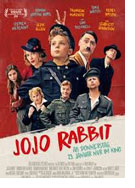

Opening 23 Jan 2020
Directed by:
Taika Waititi
Writing credits:
Christine Leunens, Taika Waititi
Principal actors:
Roman Griffin Davis, Thomasin McKenzie, Scarlett Johansson, Taika Waititi, Sam Rockwell
Who knew Nazis could be so funny. While Captain K (Sam Rockwell) and his comrades in arms provide plenty of comedic relief, the center of this story is 10-year-old Jojo (Roman Griffin Davis). Jojo, aided by his imaginary friend Adolph Hitler (Taika Waititi), enthusiastically embraces all things Nazi and can’t wait to fully participate in the experience. Jojo’s aspirations are cut short after a tragic accident at a Nazi-youth training camp and he is forced to hang around at home while recuperating. There, he discovers a Jewish girl, Elsa (Thomasin McKenzie), who his mother Rosie (Scarlett Johansson) is hiding in their attic. This presents Jojo with a dilemma, performing his good Nazi duty and turning the girl in would also put his mother in trouble for protecting her. So Jojo stays quiet and decides to learn about Jews.
As their relationship develops, Elsa tells Jojo that he’s not a Nazi. He’s a little boy who likes to dress up and wants to be part of a group. One can’t help but feel Jojo’s joy as he skips around town Heil Hitlering everyone to the German version of the Beatles I Want to Hold Your Hand. One also can’t help but wonder what belonging to a group, no matter how repugnant, means to those who feel as though they’ve been cast aside. We’ve seen the joy on the faces of those shouting hateful things in today’s political climate. As Taika Waititi said in a recent interview, you wouldn’t think that in 2019 you would still have to be telling people it’s bad to be a Nazi.
The satirical characterizations of the Nazis provide plenty of comedy and some real laugh-out-loud moments. But the film also has its share of tragedy and tenderness. The real stars are the young children. Their adaptability to circumstances and their ability to maintain their innocence and humanity are inspiring. Teach your children well. (Anne Crocker)
We can all do with a strong dose of outrageous satire and its relief that Jojo Rabbit emits. Wearing a cloak of historical respectability, nevertheless it pulls no punches with confronting the dangers and damage from blind loyalty to demigods, and their Machiavellian disciples. New Zealand writer-director-comedian Taika Waititi’s screenplay is based on Christine Leunens novel Caging Skies, an unflattering, hard-nosed depiction of the battling moral and ethical extremes during Hitler’s reign.
Jojo (Griffin Davis) and Yorki (Archie Yates), best friends and avid Hitler enthusiasts, are training at a Hitlerjugend (youth) site when Jojo calls on imaginary friend and idol, Adolf (Waititi) for direction. Always fervent, Adolf’s way puts Jojo on a precarious path; Captain Klenzendorf (Rockwell) and Fraulein Rahm (Rebel Wilson) have no choice but to send Jojo home. Often alone when mom (Johansson) takes care of business, the lonely boy inadvertently learns about a young Jewess (McKenzie) tucked out of sight in their home. Turning to his confidant and friend, naturally Jojo gets an ear full, and guidance that perpetuates running dialogues, and unexpected interferences.
Satiric films are seldom as fresh, and sassy as Jojo Rabbit. Young Griffin Davis and Yates are earnestly endearing, Rockwell and Johansson prove their comedic mettle, all the cast are sterling and Waititi’s performance is brilliant. In a matter of scenes, it is possible to shudder and cringe, cry and whimper, and laugh hard enough to gasp for air. Mihai Malaimare Jr.’s cinematography, Michael Giacchino’s music, Tom Eagles editing and Ra Vincent’s production design are frosting on the cake. Jojo Rabbit is heartwarmingly hilarious, absurd, and worthy of at least one viewing, if not more. (Marinell Haegelin)